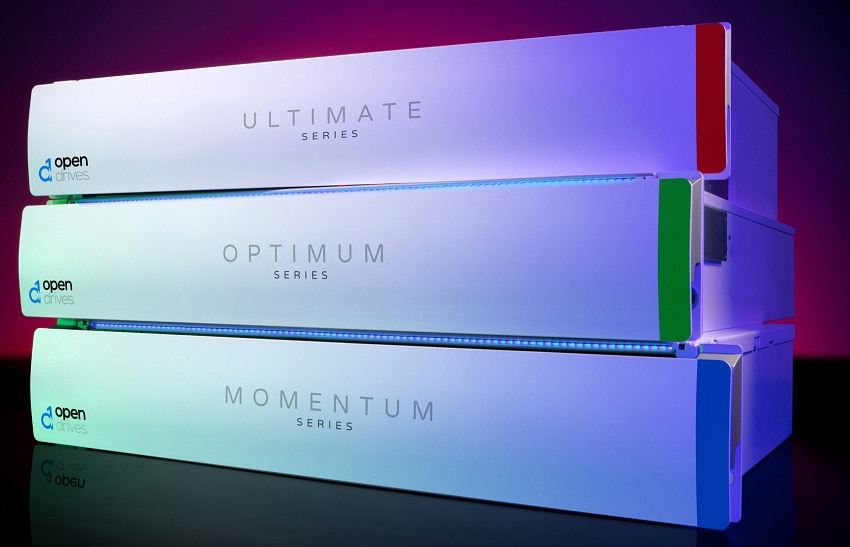Today, OpenDrives released three new data storage hardware solutions, the OpenDrives Ultra Hardware Platform. The three solutions map well with their existing lineup, and while the company hasn’t explicitly said so, it appears to be a complete refresh of their entire product line. OpenDrives was founded in 2011 and provides shared network attached storage (NAS) for high-resolution video and imaging.
Today, OpenDrives released three new data storage hardware solutions, the OpenDrives Ultra Hardware Platform. The three solutions map well with their existing lineup, and while the company hasn’t explicitly said so, it appears to be a complete refresh of their entire product line. OpenDrives was founded in 2011 and provides shared network attached storage (NAS) for high-resolution video and imaging.

OpenDrives is calling their new product lineup the “Ultra Hardware Platform.” Impressively, OpenDrives has halved the size of most of their lineup, down to a 2U form factor from 4U while keeping or improving most of the specs when compared to their previous lineup. The new lineup consists of three NAS hardware series, intended for different use cases. Each series has a unique compute module but selects storage options from a shared pool of four module options. Each module is further customizable for cost and capability. The F storage module provides 8 NVMe flash drives with a maximum estimated usable capacity of 77TB per module. The FD module is also an all-flash design. However, the FD module provides four times as many NVMe flash drives as the F one and maxes out at an estimated 230TB of usable storage. The H Module provides 21 SAS HDD (Hard Disk Drives) with a maximum estimated capacity of 200TB. The last three modules are all 2U rack units. The fourth and final module is a 4U option. The HD module provides 72 SAS HDD with a maximum estimated usable storage capacity of 660TB. At 27.5 inches in depth, the HD module is twice as deep as the F and FD modules, with the H module in between.
What OpenDrives calls the “Ultimate Series” is an all-flash NVMe design, and is their highest performance offering. As an all-flash design, it is limited to just the F and FD storage module options. Processing power is provided by sixteen cores rated for 3.6GHz. The rack unit is rated for a throughput of up to 25GB/s.
What OpenDrives calls the “Optimum Series” was developed as a hybrid design capable of mixing and matching both flash and traditional drives. It can be configured with any of the storage module options. Processing power is provided by eight cores rated for 3.8GHz. The rack unit is rated for a throughput of up to 16GB/s, or about two-thirds of its more powerful cousin.
What OpenDrives calls the “Momentum Series” is a high-capacity lower-cost design intended to deliver cost-effective storage. It is limited to just the HDD storage modules, the H, and HD. Processing power is provided by twelve cores rated for 1.9GHz. The rack unit is rated for a throughput of just 5GB/S, a third of the Optimum Series, or barely a fifth of the Ultimate Series, but still more than adequate for many use cases.
In addition to the new hardware, OpenDrives also announced plans to update its software platform. All of the company’s hardware runs on their proprietary Atlas operating system. Atlas will be getting an upgrade scheduled for Q4 of 2020. OpenDrives plans to provide the update for free to all of their customers. Planned new features include: inline and proactive caching, bandwidth throttling and actionable analytics to support business intelligence.
OpenDrives Ultra Hardware Platform Availability
New OpenDrives Ultra Hardware Platform hardware is available immediately
New Atlas Operating System is scheduled for Q4, 2020
Engage with StorageReview
Newsletter | YouTube | Podcast iTunes/Spotify | Instagram | Twitter | Facebook | RSS Feed
